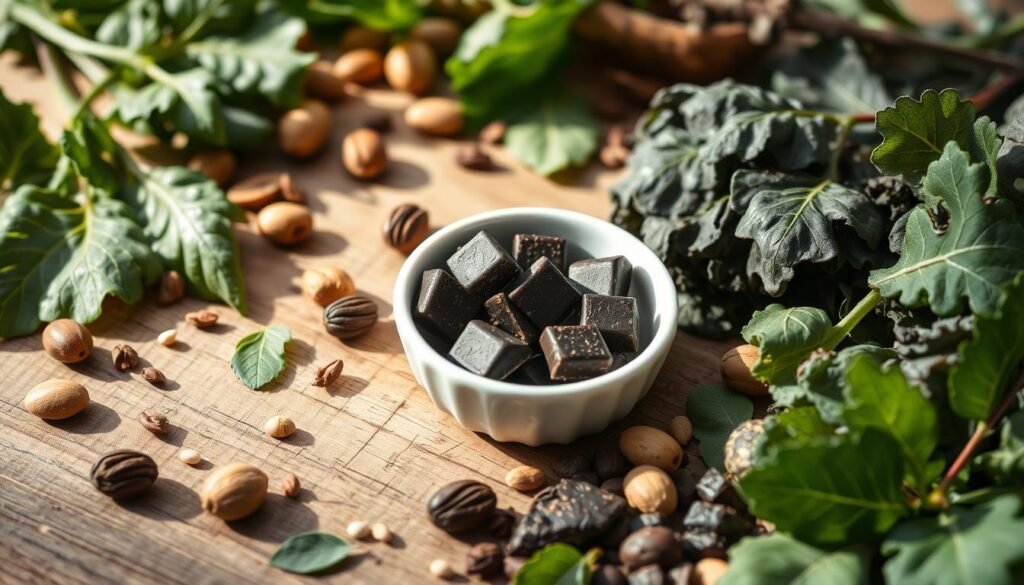About 19% of U.S. adults face anxiety disorders annually, posing a significant health issue. Nutrition plays a crucial role in mental health, research shows. Foods that fight anxiety aren’t just comforting. They contain vital nutrients that calm the mind and reduce stress. This piece explores foods that reduce anxiety fast. It shows how special compounds in these foods can help those with anxiety feel better. By eating these anxiety relieving foods regularly, you can naturally improve your mental health. Here’s a deeper look at the best foods for anxiety relief.
Key Takeaways
- About 19% of adults experience anxiety disorders each year in the U.S.
- Proper nutrition can play a vital role in alleviating anxiety symptoms.
- Incorporating omega-3 rich foods like salmon may significantly reduce anxiety.
- Herbs like chamomile and turmeric show promise in calming the mind.
- Consuming antioxidant-rich foods like dark chocolate and blueberries can offer stress relief.
- Maintaining gut health through probiotics in yogurt may improve mental health.
- Simple dietary changes can create a substantial impact on overall mental well-being.
Understanding Anxiety: A Brief Overview
Anxiety affects many people around the world. It has various symptoms that can mess with everyday life. Learning about anxiety means understanding what anxiety disorders are. It also means seeing how common they are and how they affect people. Knowing the effects of anxiety helps find better ways to handle it. This can make life better.
Definition of Anxiety Disorders
Anxiety disorders are a group of mental health issues. They are marked by a lot of fear, worry, and nervousness. This group includes problems like generalized anxiety disorder (GAD), social anxiety disorder, and different phobias. People with these disorders often feel upset in ways that make everyday life hard. Learning about anxiety helps understand why getting help is important. It also shows how to cope better.
Prevalence and Impact on Daily Life
About 19% of people in the U.S. feel anxious each year. That’s millions dealing with anxiety disorders symptoms. These symptoms can mess with jobs, friendships, and just feeling okay. Lots of people also get physical signs like muscle tightness, being easily annoyed, and trouble focusing. Up to 31.2% might deal with an anxiety disorder sometime in their life. This shows how important it is to find good treatments and ways to deal with anxiety.
Foods That Reduce Anxiety Fast: An Introduction
Eating right is key for your mental health. A good diet, filled with the right nutrients, helps your brain. It can make feelings of anxiety less intense. Foods good for stress and anxiety have things like omega-3s, vitamins, and antioxidants. These nutrients have been shown to help balance your mood and lower anxiety.
The Role of Nutrition in Mental Health
The link between what you eat and how you feel is getting more attention. Eating foods full of nutrients is a way to help handle anxiety. For example, magnesium-rich foods like spinach, almonds, and avocados are great for calming and easing anxiety symptoms.
Connecting Diet and Anxiety Symptoms
What’s going on in your gut can affect your mental health. Eating probiotic foods like yogurt can improve gut health, which helps with anxiety. Also, eating complex carbs keeps your blood sugar stable, preventing sudden mood swings. People who focus on eating well for their mental health often see a decrease in anxiety through careful food choices.
The Power of Omega-3 Fatty Acids
Omega-3 fatty acids are key for mental health, found in foods like salmon. They are important for brain function. They also help improve mood and lower anxiety.
Benefits of Fatty Fish like Salmon
Fatty fish, such as salmon, are packed with omega-3 fatty acids. These are vital for brain health. Eating these fish often brings many benefits:
- Regulation of neurotransmitters: Omega-3s help balance serotonin and dopamine, crucial for mood control.
- Reduced inflammation: They have anti-inflammatory effects that boost brain health.
- Support for cardiovascular health: Besides mind benefits, they also help heart health. This gives us another good reason to eat them.
Eating omega-3-rich fish like salmon 2-3 times a week is advised. This maximizes their health benefits.
Research Linking Omega-3s to Anxiety Relief
Many studies link omega-3s with reduced anxiety. One trial with sedentary, overweight adults showed this. Those who had more omega-3s saw a big drop in anxiety levels. The results varied by the dose:
| Group | Omega-3 Dosage (g/d) | Mean Age (years) | Cortisol Level Reduction (%) | IL-6 Level Reduction (%) |
|---|---|---|---|---|
| Placebo | 0 | 51.1 | 0 | 0 |
| Low Dose | 1.25 | 51.1 | 0 | — |
| High Dose | 2.5 | 51.0 | 19 | 33 |
This shows omega-3 fatty acids can lower stress hormones and fight inflammation. Adding fatty fish to your diet is a good option for managing anxiety.
Herbal Helpers: Chamomile and Turmeric
For centuries, people have used herbal remedies to ease anxiety. Chamomile and turmeric are notable for their calming effects. They are well-known for helping with anxiety.
Chamomile’s Anxiety-Reducing Properties
Chamomile soothes thanks to its antioxidants and anti-inflammatory perks. Research shows chamomile can really help with anxiety. One study found 1,500 mg of chamomile extract daily improved anxiety signs.
In two months, users felt more relaxed and slept better. So, regular chamomile use can make a big difference.
Curcumin in Turmeric: A Natural Anti-Anxiety Agent
Turmeric, especially its curcumin part, is great for the brain and fighting anxiety. Studies back this up. In 2020, a study showed 80 mg of curcumin daily lowered anxiety and stress in two months.
This makes curcumin a key natural option for managing anxiety. Adding it to your daily routine can be beneficial.

Antioxidant-Rich Foods for Stress Relief
Eating foods rich in antioxidants boosts mental well-being and fights anxiety. Dark chocolate and blueberries stand out for these benefits. They are tasty and may help ease stress.
The Benefits of Dark Chocolate
Dark chocolate is loved for its health perks, mainly its flavonoids. These components help protect the brain and improve blood flow. Studies show eating dark chocolate with 70-85% cocoa can enhance mood and lower stress hormones. Those who eat it often may see a dip in depression signs. This may be due to positive changes in gut bacteria affecting mental health.
How Blueberries Can Help Manage Anxiety
Blueberries are great for battling anxiety because of their antioxidants, especially anthocyanins. They safeguard cells and encourage brain health. Eating blueberries has been tied to lower anxiety levels, especially in teens. Adding them to your diet through snacks or smoothies is a tasty way to up your nutrient game and manage anxiety.
Mixing these antioxidant-packed foods into your daily meals can help manage stress and boost mental well-being.
| Food | Key Benefits | Antioxidant Component |
|---|---|---|
| Dark Chocolate | Improves mood, lowers cortisol | Flavonoids |
| Blueberries | Reduces anxiety symptoms | Anthocyanins |
Gut Health and its Connection to Anxiety
Gut health is key to mental well-being, especially with anxiety. Studies show a strong link between gut flora and mental health. Eating foods like yogurt, rich in probiotics, helps more than just your stomach.
Probiotics in Yogurt and Their Mental Health Benefits
Yogurt is packed with probiotics, such as Lactobacillus and Bifidobacterium. They may help ease anxiety symptoms. These good bacteria boost gut health and increase happiness-bringing neurotransmitters. Eating yogurt daily can better gut health and cut anxiety.
Eating foods high in prebiotics, like jicama, asparagus, and onions, feeds these good bacteria. This helps keep your gut and mind strong. Cutting back on heavily processed foods is crucial, as they harm gut flora and may increase anxiety.

Diet balance is crucial for a healthy gut, researchers say. Foods high in fiber, such as broccoli, oats, and bananas, support a healthy gut. Omega-3s from salmon and flaxseed can lessen inflammation. This aids both gut and mental health. Those curious about gut health and anxiety should check out probiotics for mental health for info on helpful probiotics.
The Calming Effects of Green Tea
Green tea is more than just a tasty drink. It’s known for its calming properties, especially when it comes to easing anxiety. It has an amino acid called L-theanine. This ingredient helps lower stress. A study with 20 healthy young men showed that green tea lowered their stress responses during mental tasks. They noticed a decrease in how tense their bodies felt.
L-Theanine as a Natural Anxiety Reducer
The L-theanine effects show us why green tea is soothing. Studies find that L-theanine cuts down stress felt by individuals and drops cortisol levels. This makes green tea a natural pick-me-up for anxious moments. The mix of L-theanine and other elements in green tea boosts its power to manage stress.
Drinking green tea daily can help you relax and brings lasting benefits. Drinking more green tea is tied to lower disease risks. Regular drinkers often see mood lifts and better focus, especially under stress.
| Benefits of Green Tea | Associated Outcomes |
|---|---|
| Reduces anxiety | Lower stress and cortisol levels |
| Boosts cognitive function | Improved task performance |
| Promotes relaxation | Enhanced feelings of calmness |
| Supports weight management | Reduction in body weight and fat |
Adding green tea to your daily habits is a smart move for those looking to feel calmer. To learn more about green tea and its benefits, check out this article.
Nutrients That Boost Mood and Reduce Anxiety
Understanding how certain nutrients affect our mental health is very helpful. Vitamins and minerals play big roles in making our mood stable and reducing anxiety. Magnesium, vitamin D, and mood connection are two main elements that influence how we feel.
The Importance of Magnesium in Your Diet
Magnesium is very important for our brain’s health. Eating foods high in magnesium can lower anxiety. Spinach, almonds, and legumes are great sources. Not having enough magnesium can make stress worse. So, eating food with lots of magnesium is good for those who want to feel less anxious.
Vitamin D’s Role in Managing Anxiety Symptoms
Vitamin D is important for feeling good. Not having enough of it can make people feel anxious or depressed. Eating foods like fatty fish and fortified dairy keeps vitamin D levels up. Studies show that vitamin D helps keep our mood steady. This makes it very important for people feeling anxious.

| Nutrient | Sources | Benefits |
|---|---|---|
| Magnesium | Spinach, almonds, legumes | Regulates stress hormones, reduces anxiety symptoms |
| Vitamin D | Fatty fish, fortified dairy | Improves mood stability, combats anxiety |
Eating more magnesium and vitamin D improves our mood and cuts down anxiety. Adding these nutrients to meals, along with eating healthy, makes us feel better. A diet full of whole foods lowers the chance of feeling anxious. People eating well are 35% less likely to be anxious or depressed than those eating lots of processed foods. For the best foods to lower anxiety, check out this guide. It lists foods that are good for managing anxiety.
Practical Tips for Incorporating These Foods
Adding foods that fight anxiety to your daily meals can make a big difference in your mood. These tips are aimed at making it easy and enjoyable to eat for your mental health. Start by adding foods to your meals that are known to reduce anxiety.
How to Add Anxiety-Fighting Foods to Daily Meals
A few simple changes can enrich your meals with nutrients that fight anxiety. Here are some strategies to add these important foods to your routine:
- Add fatty fish like salmon to weekly dinner plans.
- Snack on almonds and blueberries instead of less nutritious options.
- Substitute dark chocolate for sugary treats to avoid sugar spikes.
- Enjoy a warm cup of chamomile tea before bed to relax.
- Include probiotic-rich yogurt in snacks or breakfast for gut health.
Meals and snacks that have these foods can help reduce anxiety and boost your mental health. Eating foods rich in magnesium, like dark chocolate and leafy greens, can lessen stress. Adding anti-anxiety foods to your diet can be an easy and rewarding step.
| Food Item | Benefits |
|---|---|
| Fatty Fish (like Salmon) | Rich in omega-3 fatty acids, which reduce cortisol levels. |
| Almonds | High in magnesium, aiding in calmness and relaxation. |
| Dark Chocolate | Contains antioxidants that can lower stress hormones. |
| Chamomile | Helps promote sleep and relaxation. |
| Yogurt | Supports gut health, which can influence mood and anxiety. |
Conclusion
Eating foods to relieve anxiety daily can greatly improve mental health. Over 46.6 million adults in the U.S. were affected by anxiety and depression in 2017. This makes exploring a dietary approach to anxiety critical, alongside traditional treatments. Foods like fatty fish, dark chocolate, and green tea are rich in nutrients. They help improve mood and may reduce anxiety symptoms.
Studies also highlight the benefits of vitamins and omega-3 fatty acids for mental health. The Mediterranean diet shows success in boosting emotional well-being. It suggests the importance of diet diversity and quality in managing anxiety. By eating a variety of anxiety-supportive foods, individuals can improve their mental health holistically.
Understanding the link between diet and mental health leads to better choices that can reduce anxiety. For more details on how food affects anxiety, visit this link. A balanced diet not only benefits mental health but is key to a healthier life overall.